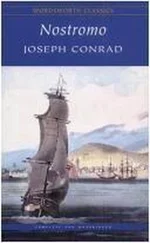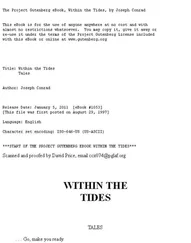Joseph Conrad - Nostromo, a Tale of the Seaboard
Здесь есть возможность читать онлайн «Joseph Conrad - Nostromo, a Tale of the Seaboard» весь текст электронной книги совершенно бесплатно (целиком полную версию без сокращений). В некоторых случаях можно слушать аудио, скачать через торрент в формате fb2 и присутствует краткое содержание. Жанр: Старинная литература, на английском языке. Описание произведения, (предисловие) а так же отзывы посетителей доступны на портале библиотеки ЛибКат.
- Название:Nostromo, a Tale of the Seaboard
- Автор:
- Жанр:
- Год:неизвестен
- ISBN:нет данных
- Рейтинг книги:4 / 5. Голосов: 1
-
Избранное:Добавить в избранное
- Отзывы:
-
Ваша оценка:
- 80
- 1
- 2
- 3
- 4
- 5
Nostromo, a Tale of the Seaboard: краткое содержание, описание и аннотация
Предлагаем к чтению аннотацию, описание, краткое содержание или предисловие (зависит от того, что написал сам автор книги «Nostromo, a Tale of the Seaboard»). Если вы не нашли необходимую информацию о книге — напишите в комментариях, мы постараемся отыскать её.
Nostromo, a Tale of the Seaboard — читать онлайн бесплатно полную книгу (весь текст) целиком
Ниже представлен текст книги, разбитый по страницам. Система сохранения места последней прочитанной страницы, позволяет с удобством читать онлайн бесплатно книгу «Nostromo, a Tale of the Seaboard», без необходимости каждый раз заново искать на чём Вы остановились. Поставьте закладку, и сможете в любой момент перейти на страницу, на которой закончили чтение.
Интервал:
Закладка:
They had propped him up in a sitting posture against the side of the lighter, and he went on with the moaning account of his adventures till his voice broke, his head fell forward. "Water," he whispered, with difficulty. Decoud held one of the cans to his lips. He revived after an extraordinarily short time, and scrambled up to his feet wildly. Nostromo, in an angry and threatening voice, ordered him forward. Hirsch was one of those men whom fear lashes like a whip, and he must have had an appalling idea of the Capataz's ferocity. He displayed an extraordinary agility in disappearing forward into the darkness. They heard him getting over the tarpaulin; then there was the sound of a heavy fall, followed by a weary sigh. Afterwards all was still in the fore-part of the lighter, as though he had killed himself in his headlong tumble. Nostromo shouted in a menacing voice—
"Lie still there! Do not move a limb. If I hear as much as a loud breath from you I shall come over there and put a bullet through your head."
The mere presence of a coward, however passive, brings an element of treachery into a dangerous situation. Nostromo's nervous impatience passed into gloomy thoughtfulness. Decoud, in an undertone, as if speaking to himself, remarked that, after all, this bizarre event made no great difference. He could not conceive what harm the man could do. At most he would be in the way, like an inanimate and useless object—like a block of wood, for instance.
"I would think twice before getting rid of a piece of wood," said Nostromo, calmly. "Something may happen unexpectedly where you could make use of it. But in an affair like ours a man like this ought to be thrown overboard. Even if he were as brave as a lion we would not want him here. We are not running away for our lives. Senor, there is no harm in a brave man trying to save himself with ingenuity and courage; but you have heard his tale, Don Martin. His being here is a miracle of fear—" Nostromo paused. "There is no room for fear in this lighter," he added through his teeth.
Decoud had no answer to make. It was not a position for argument, for a display of scruples or feelings. There were a thousand ways in which a panic-stricken man could make himself dangerous. It was evident that Hirsch could not be spoken to, reasoned with, or persuaded into a rational line of conduct. The story of his own escape demonstrated that clearly enough. Decoud thought that it was a thousand pities the wretch had not died of fright. Nature, who had made him what he was, seemed to have calculated cruelly how much he could bear in the way of atrocious anguish without actually expiring. Some compassion was due to so much terror. Decoud, though imaginative enough for sympathy, resolved not to interfere with any action that Nostromo would take. But Nostromo did nothing. And the fate of Senor Hirsch remained suspended in the darkness of the gulf at the mercy of events which could not be foreseen.
The Capataz, extending his hand, put out the candle suddenly. It was to Decoud as if his companion had destroyed, by a single touch, the world of affairs, of loves, of revolution, where his complacent superiority analyzed fearlessly all motives and all passions, including his own.
He gasped a little. Decoud was affected by the novelty of his position. Intellectually self-confident, he suffered from being deprived of the only weapon he could use with effect. No intelligence could penetrate the darkness of the Placid Gulf. There remained only one thing he was certain of, and that was the overweening vanity of his companion. It was direct, uncomplicated, naive, and effectual. Decoud, who had been making use of him, had tried to understand his man thoroughly. He had discovered a complete singleness of motive behind the varied manifestations of a consistent character. This was why the man remained so astonishingly simple in the jealous greatness of his conceit. And now there was a complication. It was evident that he resented having been given a task in which there were so many chances of failure. "I wonder," thought Decoud, "how he would behave if I were not here."
He heard Nostromo mutter again, "No! there is no room for fear on this lighter. Courage itself does not seem good enough. I have a good eye and a steady hand; no man can say he ever saw me tired or uncertain what to do; but por Dios, Don Martin, I have been sent out into this black calm on a business where neither a good eye, nor a steady hand, nor judgment are any use. . . ." He swore a string of oaths in Spanish and Italian under his breath. "Nothing but sheer desperation will do for this affair."
These words were in strange contrast to the prevailing peace—to this almost solid stillness of the gulf. A shower fell with an abrupt whispering sound all round the boat, and Decoud took off his hat, and, letting his head get wet, felt greatly refreshed. Presently a steady little draught of air caressed his cheek. The lighter began to move, but the shower distanced it. The drops ceased to fall upon his head and hands, the whispering died out in the distance. Nostromo emitted a grunt of satisfaction, and grasping the tiller, chirruped softly, as sailors do, to encourage the wind. Never for the last three days had Decoud felt less the need for what the Capataz would call desperation.
"I fancy I hear another shower on the water," he observed in a tone of quiet content. "I hope it will catch us up."
Nostromo ceased chirruping at once. "You hear another shower?" he said, doubtfully. A sort of thinning of the darkness seemed to have taken place, and Decoud could see now the outline of his companion's figure, and even the sail came out of the night like a square block of dense snow.
The sound which Decoud had detected came along the water harshly. Nostromo recognized that noise partaking of a hiss and a rustle which spreads out on all sides of a steamer making her way through a smooth water on a quiet night. It could be nothing else but the captured transport with troops from Esmeralda. She carried no lights. The noise of her steaming, growing louder every minute, would stop at times altogether, and then begin again abruptly, and sound startlingly nearer; as if that invisible vessel, whose position could not be precisely guessed, were making straight for the lighter. Meantime, that last kept on sailing slowly and noiselessly before a breeze so faint that it was only by leaning over the side and feeling the water slip through his fingers that Decoud convinced himself they were moving at all. His drowsy feeling had departed. He was glad to know that the lighter was moving. After so much stillness the noise of the steamer seemed uproarious and distracting. There was a weirdness in not being able to see her. Suddenly all was still. She had stopped, but so close to them that the steam, blowing off, sent its rumbling vibration right over their heads.
"They are trying to make out where they are," said Decoud in a whisper. Again he leaned over and put his fingers into the water. "We are moving quite smartly," he informed Nostromo.
"We seem to be crossing her bows," said the Capataz in a cautious tone. "But this is a blind game with death. Moving on is of no use. We mustn't be seen or heard."
His whisper was hoarse with excitement. Of all his face there was nothing visible but a gleam of white eyeballs. His fingers gripped Decoud's shoulder. "That is the only way to save this treasure from this steamer full of soldiers. Any other would have carried lights. But you observe there is not a gleam to show us where she is."
Decoud stood as if paralyzed; only his thoughts were wildly active. In the space of a second he remembered the desolate glance of Antonia as he left her at the bedside of her father in the gloomy house of Avellanos, with shuttered windows, but all the doors standing open, and deserted by all the servants except an old negro at the gate. He remembered the Casa Gould on his last visit, the arguments, the tones of his voice, the impenetrable attitude of Charles, Mrs. Gould's face so blanched with anxiety and fatigue that her eyes seemed to have changed colour, appearing nearly black by contrast. Even whole sentences of the proclamation which he meant to make Barrios issue from his headquarters at Cayta as soon as he got there passed through his mind; the very germ of the new State, the Separationist proclamation which he had tried before he left to read hurriedly to Don Jose, stretched out on his bed under the fixed gaze of his daughter. God knows whether the old statesman had understood it; he was unable to speak, but he had certainly lifted his arm off the coverlet; his hand had moved as if to make the sign of the cross in the air, a gesture of blessing, of consent. Decoud had that very draft in his pocket, written in pencil on several loose sheets of paper, with the heavily-printed heading, "Administration of the San Tome Silver Mine. Sulaco. Republic of Costaguana." He had written it furiously, snatching page after page on Charles Gould's table. Mrs. Gould had looked several times over his shoulder as he wrote; but the Senor Administrador, standing straddle-legged, would not even glance at it when it was finished. He had waved it away firmly. It must have been scorn, and not caution, since he never made a remark about the use of the Administration's paper for such a compromising document. And that showed his disdain, the true English disdain of common prudence, as if everything outside the range of their own thoughts and feelings were unworthy of serious recognition. Decoud had the time in a second or two to become furiously angry with Charles Gould, and even resentful against Mrs. Gould, in whose care, tacitly it is true, he had left the safety of Antonia. Better perish a thousand times than owe your preservation to such people, he exclaimed mentally. The grip of Nostromo's fingers never removed from his shoulder, tightening fiercely, recalled him to himself.
Читать дальшеИнтервал:
Закладка:
Похожие книги на «Nostromo, a Tale of the Seaboard»
Представляем Вашему вниманию похожие книги на «Nostromo, a Tale of the Seaboard» списком для выбора. Мы отобрали схожую по названию и смыслу литературу в надежде предоставить читателям больше вариантов отыскать новые, интересные, ещё непрочитанные произведения.
Обсуждение, отзывы о книге «Nostromo, a Tale of the Seaboard» и просто собственные мнения читателей. Оставьте ваши комментарии, напишите, что Вы думаете о произведении, его смысле или главных героях. Укажите что конкретно понравилось, а что нет, и почему Вы так считаете.












